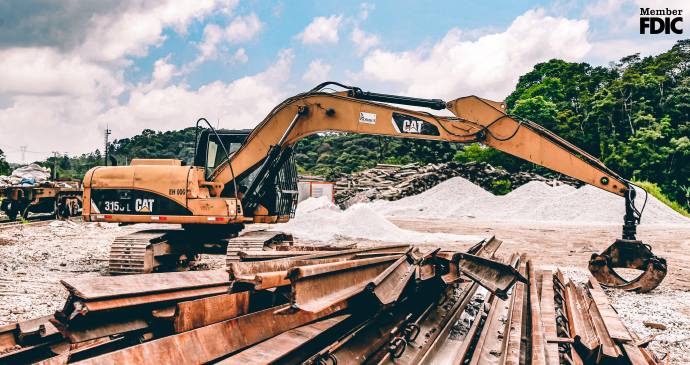
It’s not uncommon for companies that work in the construction industry to experience ups, downs, and irregularities in cash flow. Construction work tends to be seasonal, and many companies experience revenue decreases during the colder months.
When business picks back up again, there’s often a significant number of expenses incurred before payment is collected. Many contractors use lines of credit (LOC) to finance mobilization expenses such as raw materials, equipment costs, and workforce labor.
Lines of Credit for Contractors
An LOC is a form of short-term working capital. It is a revolving loan, which means you can borrow up to your established limit without needing to reapply each time, and you only pay interest on what you borrow. An LOC has a short timeframe for repayment. Ideally, an LOC will be repaid within the month that it’s borrowed, but sometimes they are repaid over a period of months.
An LOC is a helpful resource for supplementing temporary cash shortages for day-to-day expenses. But if your business is regularly approaching its credit limit, or you have more on your LOC than you do in outstanding receivables, it might be time to think about a permanent working capital loan, like a Small Business Administration (SBA) 7(a) loan.
How an SBA Loan Can Benefit Contractors
A permanent working capital loan provides a long-term source of finance that is repaid over an extended period of time. An SBA 7(a) loan can be a great option for contractors that need a source of funding for their daily operations.
If a contractor relies too heavily on an LOC, they may find themselves accruing more in credit than they have in outstanding invoices. Because LOCs are short-term loans, this means a large sum of money will need to be repaid quickly before access to credit is suspended. This can put contractors in a tough position, especially if circumstances beyond their control are delaying projects.
Using an SBA 7(a) loan gives contractors access to a store of cash to fund upfront project expenses. Then, an LOC can supplement temporary operational shortfalls if needed. SBA 7(A) loans have longer terms than most conventional business loans, which can make the monthly repayment manageable. As contractors continue to collect on invoices throughout the season and over the winter, they can repay the loan while maintaining good cash flow, and also retain earnings within the company to prepare for the next busy season, or increase the ability to take on more projects.
Another key benefit of an SBA 7(a) loan is that it is made based on the cash flow of the business, and not collateral used to secure the loan. Because working capital loans are difficult to collateralize, it can be challenging to obtain a conventional business loan for these purposes, or to find other types of financing at reasonable interest rates. Because a 7(a) loan has the backing of the SBA, lenders are willing to make loans that aren’t fully secured with collateral. The SBA also sets maximum interest rates.
Trust LSB with Financing for Your Contracting Business
SBA loans require specialized knowledge – you can trust the experienced small business lending team at LSB. We understand the unique financing needs of contractors and will help you with a solution that’s the right fit for your business. Contact us to learn more about how we can help!
Lincoln Savings Bank. Member FDIC.

